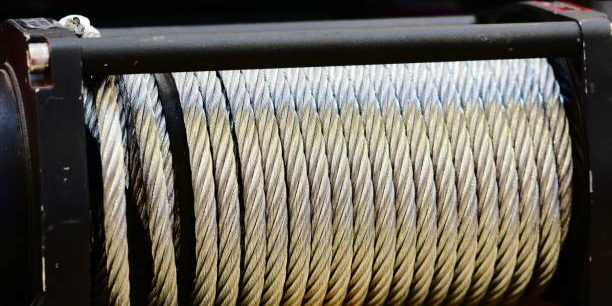As powerful and impressive as winches and their capabilities are, being able to make the most of their abilities relies heavily on using an appropriate cable that also has the strength and resistance to hold the heavy loads winches are so used to pulling.
But what materials are used for winch cables, and which is the best? Read on as we compare some.
What is a Winch Cable?
Before delving into our comparison of winch cable materials, let us first briefly discuss what a winch cable actually is. As its name suggests, a winch cable is the cable that winds around the winch drum, or spool, and attaches to the load that is being towed.
It is this cable where the tension is adjusted as the winch either lets it out or reels it in as it positions and pulls loads.
Comparing Winch Cable Materials
Steel
Steel winch cables tend to be the industry standard, particular aircraft-grade steel, thanks to their strength and durability. This material is great for using in highly abrasive terrains, such as in mud or sand, as it’s less likely to be damaged through fraying and abrading than other materials.
Another aspect that makes steel such a favourable material choice for winch cables is its price point. Compared to synthetic rope, it’s not only more affordable, but requires less maintenance. This minimises downtime and ensures a continually efficient operation.
With that said, it can develop rust over time. Steel chain is also prone to kinking, which can result in it not winding around the drum properly, ultimately decreasing its strength or causing operational issues.
Synthetic Rope
The most common alternative to steel chain is synthetic rope. Often made from polyethylene, it’s considered a safer material than steel, not to mention lighter and easier to handle. It also has a higher breaking point than steel, making it a highly reliable option.
However, being synthetic, it can be susceptible to UV exposure, chemicals, heat and abrasion, all of which have the potential to substantially weaken the rope. Although, they can be covered with protective coating to protect them against this.
Natural Rope
Whilst very rarely used anymore, if at all, natural rope was once the go to material of choice for winches – particularly in the marine industry.
One of its strongest properties is that it’s environmentally friendly, since it’s made using natural fibres. This also means that they’re naturally resistant to a lot of biological damage, such as UV rays. The construction of natural rope is also naturally strong, although it can be prone to fraying.
Another downside of natural rope is that it isn’t water resistant. Instead, it will absorb water and can actually shrink when wet. This makes it both heavier to handle and weaken the rope.
Winch Specialists
Here at Atlas Winch Hire & Hoist Services, we supply only top-quality winches, so you can expect reliable materials and winching solutions from us.
We have experience providing lifting equipment hire for all major industries, such as utilities, construction, oil, gas, renewables and engineering.
If you think our products would be a good fit for your business, then get in touch with us today.








